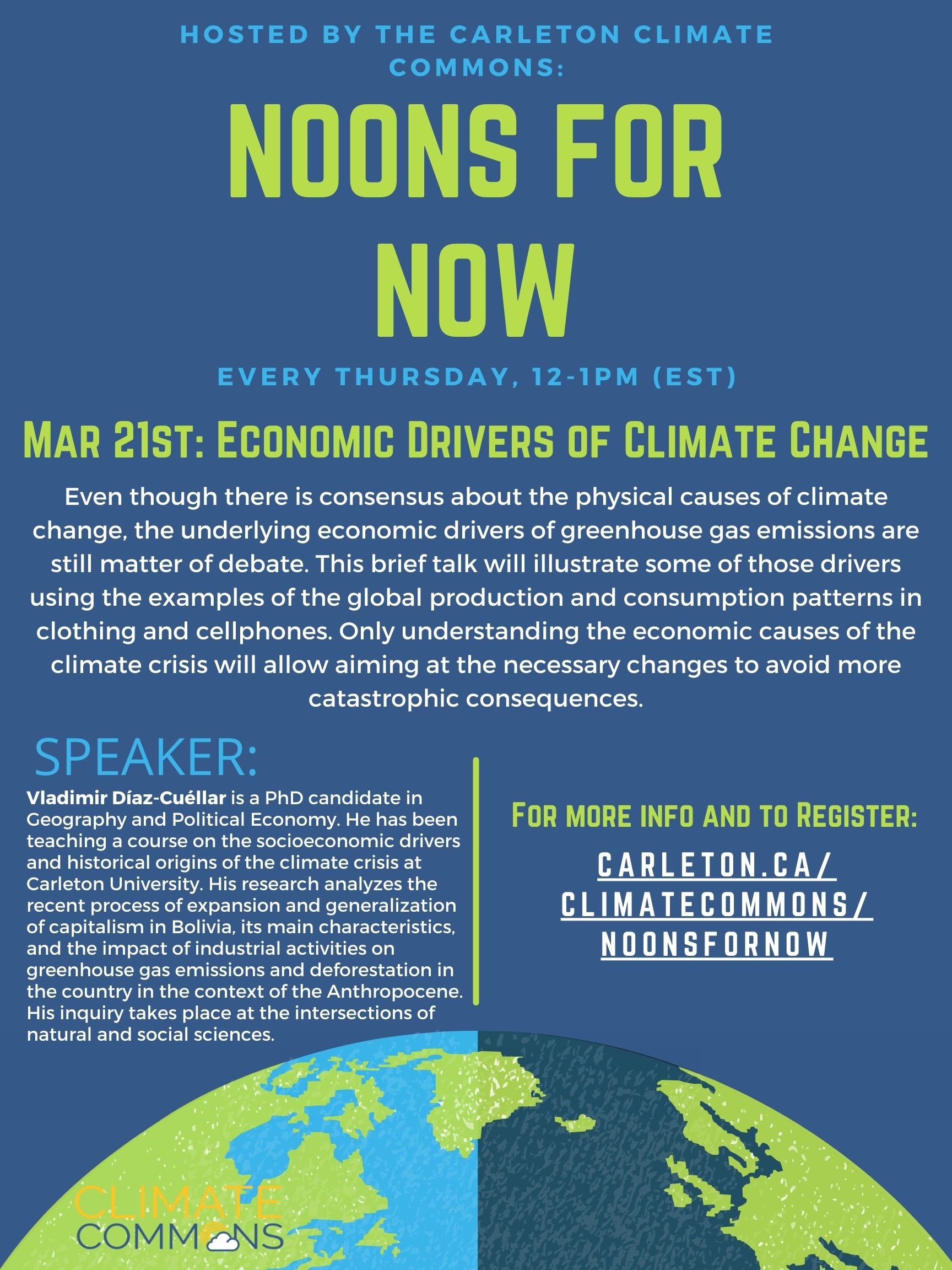 Even though there is consensus about the physical causes of climate change, the underlying economic drivers of greenhouse gas emissions are still matter of debate. This brief talk will illustrate some of those drivers using the examples of the global production and consumption patterns in clothing and cellphones. Only understanding the economic causes of the climate crisis will allow aiming at the necessary changes to avoid more catastrophic consequences.
Even though there is consensus about the physical causes of climate change, the underlying economic drivers of greenhouse gas emissions are still matter of debate. This brief talk will illustrate some of those drivers using the examples of the global production and consumption patterns in clothing and cellphones. Only understanding the economic causes of the climate crisis will allow aiming at the necessary changes to avoid more catastrophic consequences.
Speaker: Vladimir Díaz-Cuéllar is a PhD candidate in Geography and Political Economy. He has been teaching a course on the socioeconomic drivers and historical origins of the climate crisis at Carleton University since 2020. His research analyzes the recent process of expansion and generalization of capitalism in Bolivia, its main characteristics, and the impact of industrial activities on greenhouse gas emissions and deforestation in the country in the context of the Anthropocene. His inquiry takes place at the intersections of natural and social sciences.
Actions
- Participate in “buy nothing” groups on Facebook or other resale sites
- Start a “share network” by sharing items with people you know, and avoid donating items
- Bring your broken items to the Repair Café hosted by Ottawa Tool Library
- Check out Odd Bunch, a food waste redistribution system https://www.oddbunch.ca/
Resource List
The following is a list of resources recommended by attendees at our event.
Scientific Articles and Journals:
- Vlad’s Lectures on Economic Drivers of Climate Change
- International Panel of Climate Change recent report
- Textile Exchange Materials Market Report
- https://slocat.net/
- International Energy Agency “As their sales continue to rise, SUV’s global CO2 emissions are nearing 1 billion tonnes”
- International Labour Organization “The future of work in the automotive industry. The need to invest in peoples capabilities and decent and sustainable work”
- The Automobile Industry Pocket Guide
- Gross national happiness in Bhutan: the big idea from a tiny state that could change the world
- The Natural Resource Indicators (NRI), Stats Canada
- Why Some of Our Clothes Are Over 200 Million Years Old, by Daphne Chouliaraki Milner
- Peters, G., Li, M. & Lenzen, M. The need to decelerate fast fashion in a hot climate – A global sustainability perspective on the garment industry. Journal of Cleaner Production 295, 126390 (2021).
- Oguchi, M. & Fuse, M. Regional and Longitudinal Estimation of Product Lifespan Distribution: A Case Study for Automobiles and a Simplified Estimation Method. Environ. Sci. Technol. 49, 1738–1743 (2015).
- Chancel, L. Global carbon inequality over 1990–2019. Nat Sustain 5, 931–938 (2022).
Books:
- Energy and Civilization: A History, Valclav Smil
- Grand transitions: How the Modern World Was Made, Valclav Smil
- The Global Automotive Industry, Nieuwenhuis and Wells
- This Changes Everything: Capitalism vs. The Climate, Naomi Klein